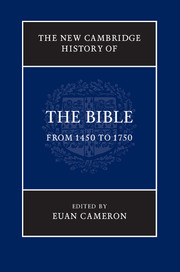Book contents
- Frontmatter
- Contents
- List of figures
- List of contributors
- Preface
- List of abbreviations
- Introduction
- PART I RETRIEVING AND EDITING THE TEXT IN EARLY MODERN EUROPE
- PART II PRODUCING AND DISSEMINATING THE BIBLE IN TRANSLATION
- PART III PROCESSING THE BIBLE: COMMENTARY, CATECHESIS, LITURGY
- 16 Authority
- 17 Theories of interpretation: The quadriga and its successors
- 18 The importance of the Bible for early Lutheran theology
- 19 The Bible in Reformed thought, 1520–1750
- 20 The Bible in Roman Catholic theology, 1450–1750
- 21 Orthodox biblical exegesis in the early modern world (1450–1750)
- 22 The Bible in the pulpit, 1500–1750
- 23 The Bible in catechesis, c. 1500– c. 1750
- 24 The Bible in liturgy and worship, c. 1500–1750
- PART IV THE BIBLE IN THE BROADER CULTURE
- PART V BEYOND EUROPE
- Afterword
- Select bibliography
- Select Bible bibliography
- Index
20 - The Bible in Roman Catholic theology, 1450–1750
from PART III - PROCESSING THE BIBLE: COMMENTARY, CATECHESIS, LITURGY
Published online by Cambridge University Press: 05 August 2016
- Frontmatter
- Contents
- List of figures
- List of contributors
- Preface
- List of abbreviations
- Introduction
- PART I RETRIEVING AND EDITING THE TEXT IN EARLY MODERN EUROPE
- PART II PRODUCING AND DISSEMINATING THE BIBLE IN TRANSLATION
- PART III PROCESSING THE BIBLE: COMMENTARY, CATECHESIS, LITURGY
- 16 Authority
- 17 Theories of interpretation: The quadriga and its successors
- 18 The importance of the Bible for early Lutheran theology
- 19 The Bible in Reformed thought, 1520–1750
- 20 The Bible in Roman Catholic theology, 1450–1750
- 21 Orthodox biblical exegesis in the early modern world (1450–1750)
- 22 The Bible in the pulpit, 1500–1750
- 23 The Bible in catechesis, c. 1500– c. 1750
- 24 The Bible in liturgy and worship, c. 1500–1750
- PART IV THE BIBLE IN THE BROADER CULTURE
- PART V BEYOND EUROPE
- Afterword
- Select bibliography
- Select Bible bibliography
- Index
Summary
Roman Catholic theologians of the late Middle Ages inherited a system of methods and sources with which to work out answers to philosophical and practical questions long held in controversy among Christian believers. Catholic interpreters of Scripture, usually university professors and higher-ranking clergy, used the Latin Vulgate version and made extensive use of patristic writings by renowned early scholars of the faith such as Augustine of Hippo (354–430). They also applied methods of pre-Christian philosophers, including Aristotle's system of categorising and applying knowledge. Other theological sources included canon law (containing conciliar decrees and patristic writings), the decretals (papal decrees since the mid-twelfth century) and multi-volume scriptural commentaries such as the Glossa Ordinaria and works by Thomas Aquinas (1225–74) and Peter Lombard (c. 1100–60). Use of such canonical sources, a single translation of Scripture (that varied among manuscript copies), and philosophical methods of sorting through all possible conclusions and objections for one presumably correct answer to a question gave rise to the term ‘systematic’ for this type of theology. While chiefly maintaining status quo doctrines and practices, such theological work, the focus of the first section of this chapter, challenged powerful forces in society and called for reform. Catholic spiritual writings of the era also exhibit a systematic, Bible-centred approach to monastic and personal devotion. In the second section I treat controversial theology: writings by Catholics aimed at a Protestant audience or meant for the instruction of Catholics in how to refute Protestant doctrines and biblical interpretation. The final section examines Catholic theology collectively from 1600 to 1750, when a demand for Scripture-focused popular theology in northern Europe contrasted with traditional works maintaining an integrated use of sources.
Systematic theology and spiritual writings before Trent
The familiar Protestant accusation that the Bible played a small role in Catholic theology would have seemed very strange to the late medieval theologian. Intellectual life revolved around the study of the Bible, from the highest degrees at universities, to the basis of legal systems, to the cornerstone of lay spirituality. Still, the complexity of the scholastic method, the inaccessibility of dense biblical commentaries in Latin and the central authority exercised over the highest levels of scriptural interpretation left the Church vulnerable to allegations that the Pope and clergy were enemies of Scripture rather than the Christian Bible's custodians and inspired exegetes since late antiquity.
- Type
- Chapter
- Information
- The New Cambridge History of the Bible , pp. 489 - 517Publisher: Cambridge University PressPrint publication year: 2016
- 2
- Cited by

